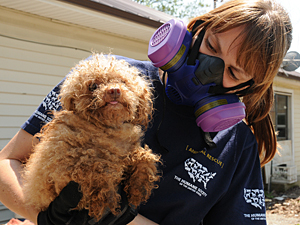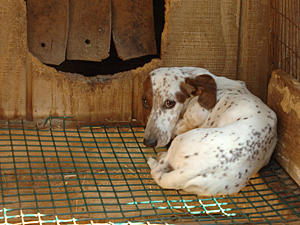
That cute puppy in the pet store window might horrify you if she were to tell you where she came from.
Photo by Kathy Milani, The HSUS
Does It Matter Where I Get My Dog?
Reprinted from The Peppertree Post, published by Peppertree Rescue, an Alliance Participating Organization
So, what's wrong with buying a dog from a pet store or a backyard breeder?
This is a question that often comes up in conversations between dog rescue people and the general public. There are many reasons for people to spend time doing their homework before committing to purchase a dog that will be with the family for years. With the availability of information on the Internet it's easier than ever before to get the knowledge you need to make a thoughtful purchase.
Available puppies come from a few main sources:
Backyard breeders or the hobby breeder who has a pair or several pairs of dogs that are bred to supplement their income.
Pet stores who generally purchase their puppies from puppy mills, most often the Amish or the millers in the Midwestern states, such as Missouri and Arkansas.
Breeders who focus on one or maybe two breeds and are serious students of genetics and also try to either improve the breed or at least not pass on hereditary problems.
All too often, people are lured into a spontaneous and later regrettable purchase as they wander into a pet shop and fall for those lovely soft eyes. Or they are attracted to a classified ad from someone who breeds dogs in their home. However well intentioned these people may be there are more reasons to not make the purchase than to make it!

Puppy mill puppies are born and raised in deplorable conditions — often to unhealthy parents — without proper socialization before they are sold to pet stores.
Photo by Kathy Milani, The HSUS
Dogs from puppy mills and private individuals are often the products of parents who've never received appropriate veterinary care nor have they been health tested for congenital problems such as hip dysplasia, glaucoma, heart problems, and renal illnesses, just to mention a few. Many breeds have known hereditary health problems and a good breeder will not breed dogs who have any of these issues so as not to pass on the problem to another generation. It's always wise to know what health issues may be attached to a breed and to ask the breeder what testing is done to try to minimize the risk. Unscrupulous salespeople will try to tell you that since they guarantee their puppies (meaning if the dog is ill you can return it for another one) health testing of the parents is not necessary. Do not fall for that. These people count on the fact that the owner is totally in love with the dog by the time the illness manifests itself and won't be exchanging the dog for a new one.
Many dogs from these environments are moved too young and before they've had time to learn "to be a dog" from their mother and littermates. Older dogs who are not sold do not get human contact at the critical point in their development so that they can bond with people. These dogs are born in and live in crates where they simply eliminate as needed and this makes for an extremely challenging housebreaking task. Sometimes the inability to housebreak one of these dogs or the dog's fearfulness lands the dog in a shelter or rescue as the new owner cannot manage to solve the problems the dog has. There's also the issue of communicable diseases. When so many dogs are in such a small environment there are illnesses such as parvo and distemper, which can rage through the herd. Lesser problems such as parasites also abound. In addition to temperament issues caused by lack of socialization there are also issues of ill temperament that are passed down from generation to generation. Often these poor creatures are transported all over in dark and confined trucks with crates stacked up to the roof. This in itself can create enough trauma to last a lifetime. Some of us remember that periodically trucks are pulled over on the Northway or Thruway that have been filled with dogs being transported.

Female dogs in puppy mills are bred continuously throughout their lives until they no longer produce puppies, at which time they are destroyed.
Photo by Kathy Milani, The HSUS
There are also the conditions in which the brood bitches live. These female dogs are treated like nothing more than breeding machines. Often when in season they are put in an area with several males to ensure that a breeding happens. Then they are moved to their cages where they give birth. This cycle replicates itself over and over until the bitch is no longer productive. At that point she's taken out back and shot. It's a lifetime of misery for the poor dog. The millers are careful to stay just on the right side of the law in case the U.S. Department of Agriculture, who has oversight, happens to inspect the facility.
Interestingly enough, the state of Pennsylvania has taken a more aggressive stand on puppy mills, largely due to the Amish breedings. Unfortunately, with that heightened scrutiny many of those millers have simply crossed the border into New York where they are able to buy up farmland and resume business in a less public manner. So now it's become a New York problem!
Sometimes the older dogs end up in auctions where they are sold to anyone who will bid the most for them. This is a controversial topic in rescue groups as there are groups who believe they are "saving" a dog by doing this and others who believe that to participate in the auction merely sentences more dogs to the inhumane treatment of the puppy mill. Peppertree has a firm policy on this. The only time we have taken a dog at auction is when we have the assurance that a miller is going out of business. It's not been a frequent practice but it has happened.

Buying a puppy from a pet store or backyard breeder perpetuates the cycle of abuse and can leave you open to heartbreaking and expensive problems with your pet.
Photo by PETA
Then comes the issue of price. A backyard breeder and a pet store sell these inferior dogs for a lot more money than you'd spend going to a reputable breeder. The purchase price coupled with the ongoing vet bills for some of these poor critters is daunting. Classified ads will state "with papers," giving the buyer the impression that that means the dog is of good quality…wrong. That simply means that both parents are purebred and eligible for registration with the AKC. It means absolutely nothing more than that.
When you are ready to make the leap to purchase a dog, seek out a breeder who is a member of a national breed club, as all clubs have ethics that their members must follow. If you are looking for a mixed breed dog, seek out a reputable rescue. That way the dog will have been evaluated and vetted. Remember that the "something-poos" you see in the classified ads are nothing more than expensive mixes most likely from a backyard breeder.
When you buy from a pet shop or backyard breeder, even though you don't intend to be doing harm, and you think you are helping that one animal, you are perpetuating the problem, as more dogs are bred to fill the slots of those purchased. Resist the urge to put your money in the pockets of the uncaring people who subject dogs to this lifestyle, and support your local rescue.
About the Author
Leda Kim is a long-time volunteer with Peppertree Rescue, doing behind-the-scenes administrative work since the first year the organization was founded. She is also the New York State Rescue Coordinator for the American Bouvier Rescue League. She is retired and spends her days doing animal rescue, quilting, knitting, and enjoying the companionship of her dogs. She looks at rescue as her way of giving back to the creatures who've made her life so full.






